LLB Law: Property Law - Question 3: Estate Devolution Analysis
VerifiedAdded on 2022/08/25
|12
|3822
|33
Report
AI Summary
This report provides a comprehensive analysis of property law, specifically addressing the devolution of legal and beneficial estates in a case study involving multiple property owners. The analysis explores the rights of various parties, including Dita, in relation to the sale of a jointly owned property. The report delves into the distinctions between joint tenants and tenants in common, emphasizing the implications of each for property ownership and inheritance. It examines the application of relevant legislation, such as the Administration of Estates Act 1925 and the Trusts of Land and Appointment of Trustees Act 1996, to determine the rights and obligations of the parties involved. Furthermore, the report provides advice to Dita on the steps she can take to compel the sale of the property, considering Mohammed's will and the actions of other co-owners. The report also addresses the legal interests, beneficial interests, and potential disagreements among the owners, providing insights into how the court might resolve disputes related to property sales. The analysis considers the importance of factors such as the intention of the parties and the circumstances of Xena's pregnancy in the court's decision-making process.

LLB Law
Page 1
Page 1
Paraphrase This Document
Need a fresh take? Get an instant paraphrase of this document with our AI Paraphraser
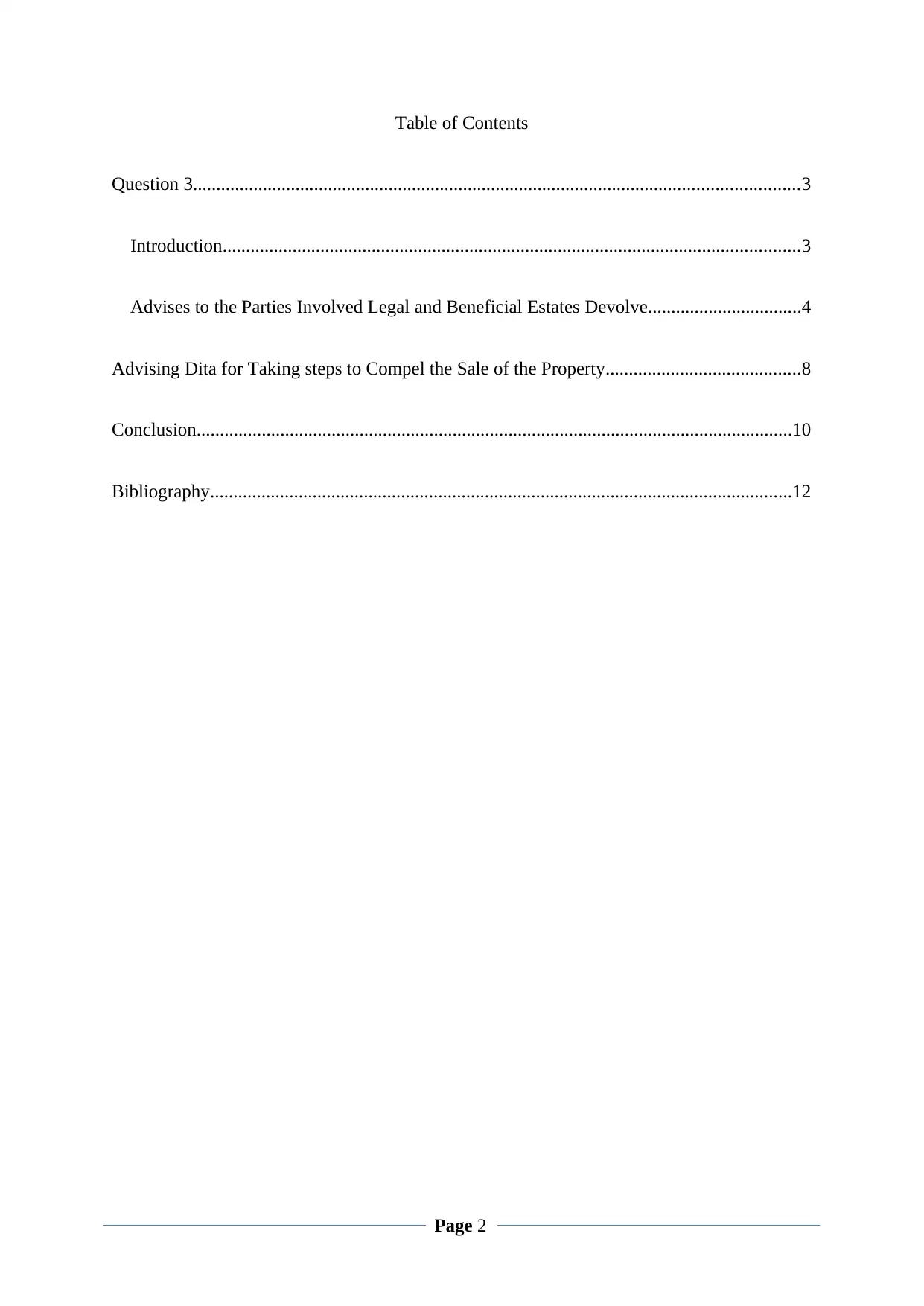
Table of Contents
Question 3..................................................................................................................................3
Introduction............................................................................................................................3
Advises to the Parties Involved Legal and Beneficial Estates Devolve.................................4
Advising Dita for Taking steps to Compel the Sale of the Property..........................................8
Conclusion................................................................................................................................10
Bibliography.............................................................................................................................12
Page 2
Question 3..................................................................................................................................3
Introduction............................................................................................................................3
Advises to the Parties Involved Legal and Beneficial Estates Devolve.................................4
Advising Dita for Taking steps to Compel the Sale of the Property..........................................8
Conclusion................................................................................................................................10
Bibliography.............................................................................................................................12
Page 2
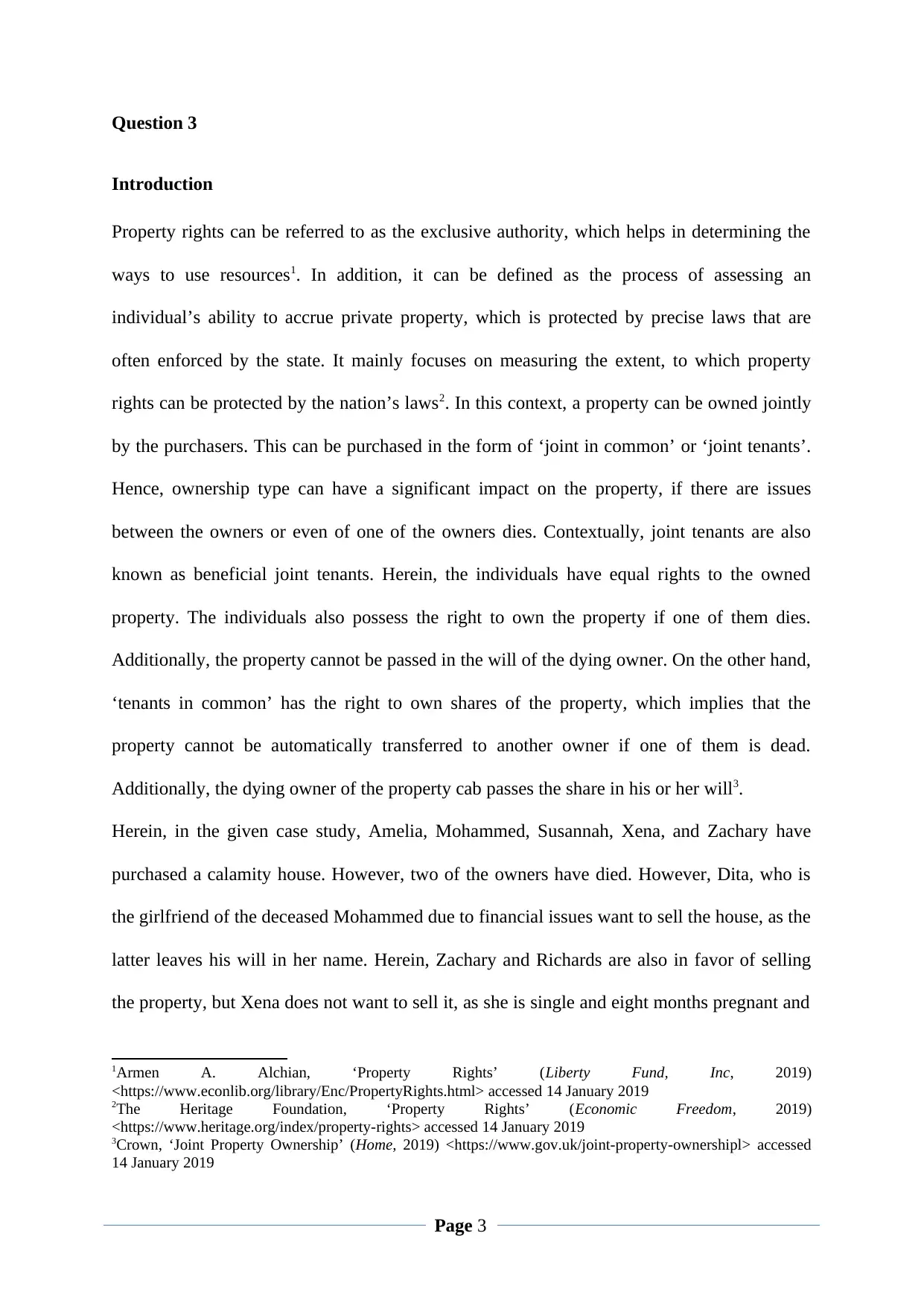
Question 3
Introduction
Property rights can be referred to as the exclusive authority, which helps in determining the
ways to use resources1. In addition, it can be defined as the process of assessing an
individual’s ability to accrue private property, which is protected by precise laws that are
often enforced by the state. It mainly focuses on measuring the extent, to which property
rights can be protected by the nation’s laws2. In this context, a property can be owned jointly
by the purchasers. This can be purchased in the form of ‘joint in common’ or ‘joint tenants’.
Hence, ownership type can have a significant impact on the property, if there are issues
between the owners or even of one of the owners dies. Contextually, joint tenants are also
known as beneficial joint tenants. Herein, the individuals have equal rights to the owned
property. The individuals also possess the right to own the property if one of them dies.
Additionally, the property cannot be passed in the will of the dying owner. On the other hand,
‘tenants in common’ has the right to own shares of the property, which implies that the
property cannot be automatically transferred to another owner if one of them is dead.
Additionally, the dying owner of the property cab passes the share in his or her will3.
Herein, in the given case study, Amelia, Mohammed, Susannah, Xena, and Zachary have
purchased a calamity house. However, two of the owners have died. However, Dita, who is
the girlfriend of the deceased Mohammed due to financial issues want to sell the house, as the
latter leaves his will in her name. Herein, Zachary and Richards are also in favor of selling
the property, but Xena does not want to sell it, as she is single and eight months pregnant and
1Armen A. Alchian, ‘Property Rights’ (Liberty Fund, Inc, 2019)
<https://www.econlib.org/library/Enc/PropertyRights.html> accessed 14 January 2019
2The Heritage Foundation, ‘Property Rights’ (Economic Freedom, 2019)
<https://www.heritage.org/index/property-rights> accessed 14 January 2019
3Crown, ‘Joint Property Ownership’ (Home, 2019) <https://www.gov.uk/joint-property-ownershipl> accessed
14 January 2019
Page 3
Introduction
Property rights can be referred to as the exclusive authority, which helps in determining the
ways to use resources1. In addition, it can be defined as the process of assessing an
individual’s ability to accrue private property, which is protected by precise laws that are
often enforced by the state. It mainly focuses on measuring the extent, to which property
rights can be protected by the nation’s laws2. In this context, a property can be owned jointly
by the purchasers. This can be purchased in the form of ‘joint in common’ or ‘joint tenants’.
Hence, ownership type can have a significant impact on the property, if there are issues
between the owners or even of one of the owners dies. Contextually, joint tenants are also
known as beneficial joint tenants. Herein, the individuals have equal rights to the owned
property. The individuals also possess the right to own the property if one of them dies.
Additionally, the property cannot be passed in the will of the dying owner. On the other hand,
‘tenants in common’ has the right to own shares of the property, which implies that the
property cannot be automatically transferred to another owner if one of them is dead.
Additionally, the dying owner of the property cab passes the share in his or her will3.
Herein, in the given case study, Amelia, Mohammed, Susannah, Xena, and Zachary have
purchased a calamity house. However, two of the owners have died. However, Dita, who is
the girlfriend of the deceased Mohammed due to financial issues want to sell the house, as the
latter leaves his will in her name. Herein, Zachary and Richards are also in favor of selling
the property, but Xena does not want to sell it, as she is single and eight months pregnant and
1Armen A. Alchian, ‘Property Rights’ (Liberty Fund, Inc, 2019)
<https://www.econlib.org/library/Enc/PropertyRights.html> accessed 14 January 2019
2The Heritage Foundation, ‘Property Rights’ (Economic Freedom, 2019)
<https://www.heritage.org/index/property-rights> accessed 14 January 2019
3Crown, ‘Joint Property Ownership’ (Home, 2019) <https://www.gov.uk/joint-property-ownershipl> accessed
14 January 2019
Page 3
⊘ This is a preview!⊘
Do you want full access?
Subscribe today to unlock all pages.

Trusted by 1+ million students worldwide
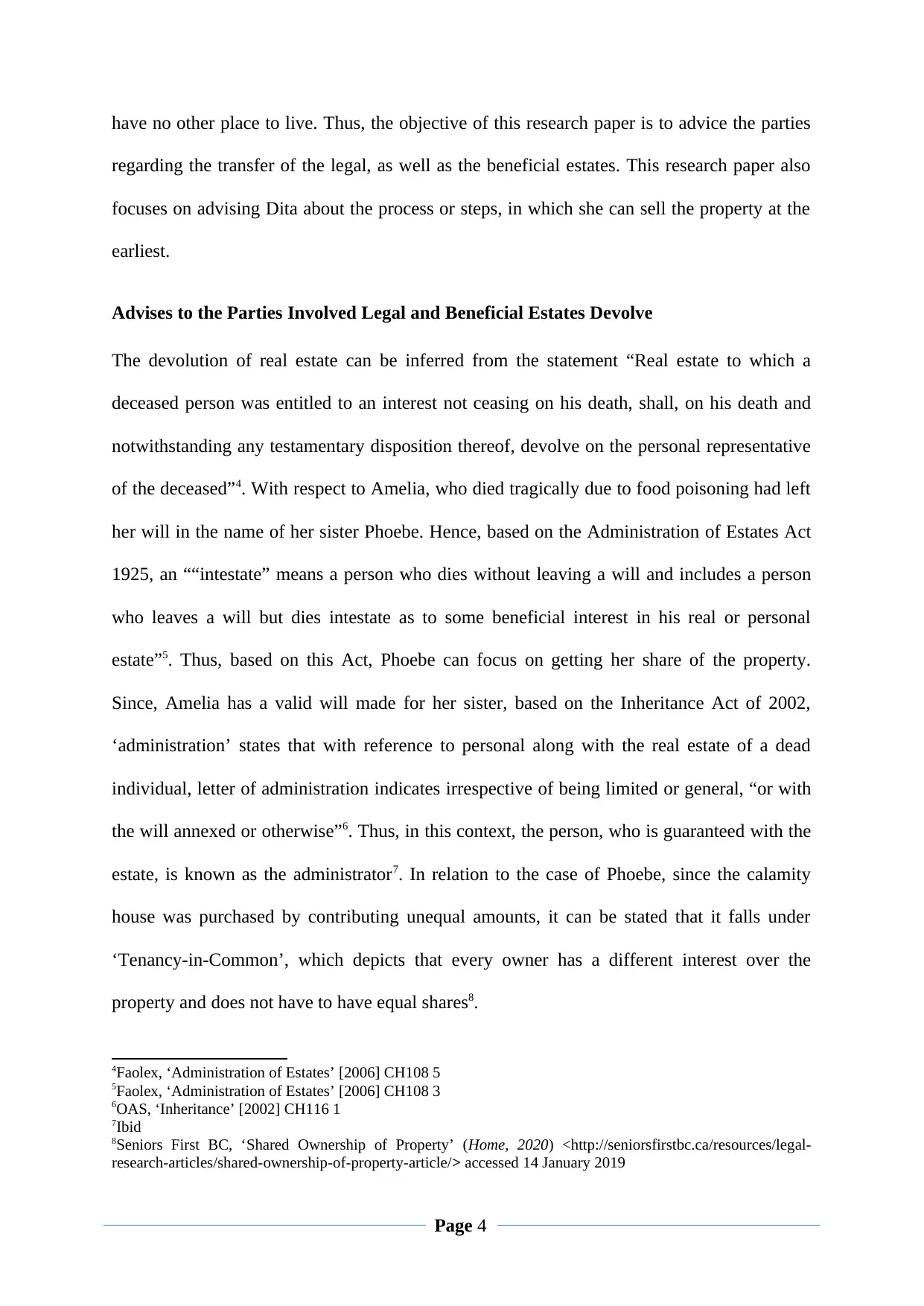
have no other place to live. Thus, the objective of this research paper is to advice the parties
regarding the transfer of the legal, as well as the beneficial estates. This research paper also
focuses on advising Dita about the process or steps, in which she can sell the property at the
earliest.
Advises to the Parties Involved Legal and Beneficial Estates Devolve
The devolution of real estate can be inferred from the statement “Real estate to which a
deceased person was entitled to an interest not ceasing on his death, shall, on his death and
notwithstanding any testamentary disposition thereof, devolve on the personal representative
of the deceased”4. With respect to Amelia, who died tragically due to food poisoning had left
her will in the name of her sister Phoebe. Hence, based on the Administration of Estates Act
1925, an ““intestate” means a person who dies without leaving a will and includes a person
who leaves a will but dies intestate as to some beneficial interest in his real or personal
estate”5. Thus, based on this Act, Phoebe can focus on getting her share of the property.
Since, Amelia has a valid will made for her sister, based on the Inheritance Act of 2002,
‘administration’ states that with reference to personal along with the real estate of a dead
individual, letter of administration indicates irrespective of being limited or general, “or with
the will annexed or otherwise”6. Thus, in this context, the person, who is guaranteed with the
estate, is known as the administrator7. In relation to the case of Phoebe, since the calamity
house was purchased by contributing unequal amounts, it can be stated that it falls under
‘Tenancy-in-Common’, which depicts that every owner has a different interest over the
property and does not have to have equal shares8.
4Faolex, ‘Administration of Estates’ [2006] CH108 5
5Faolex, ‘Administration of Estates’ [2006] CH108 3
6OAS, ‘Inheritance’ [2002] CH116 1
7Ibid
8Seniors First BC, ‘Shared Ownership of Property’ (Home, 2020) <http://seniorsfirstbc.ca/resources/legal-
research-articles/shared-ownership-of-property-article/> accessed 14 January 2019
Page 4
regarding the transfer of the legal, as well as the beneficial estates. This research paper also
focuses on advising Dita about the process or steps, in which she can sell the property at the
earliest.
Advises to the Parties Involved Legal and Beneficial Estates Devolve
The devolution of real estate can be inferred from the statement “Real estate to which a
deceased person was entitled to an interest not ceasing on his death, shall, on his death and
notwithstanding any testamentary disposition thereof, devolve on the personal representative
of the deceased”4. With respect to Amelia, who died tragically due to food poisoning had left
her will in the name of her sister Phoebe. Hence, based on the Administration of Estates Act
1925, an ““intestate” means a person who dies without leaving a will and includes a person
who leaves a will but dies intestate as to some beneficial interest in his real or personal
estate”5. Thus, based on this Act, Phoebe can focus on getting her share of the property.
Since, Amelia has a valid will made for her sister, based on the Inheritance Act of 2002,
‘administration’ states that with reference to personal along with the real estate of a dead
individual, letter of administration indicates irrespective of being limited or general, “or with
the will annexed or otherwise”6. Thus, in this context, the person, who is guaranteed with the
estate, is known as the administrator7. In relation to the case of Phoebe, since the calamity
house was purchased by contributing unequal amounts, it can be stated that it falls under
‘Tenancy-in-Common’, which depicts that every owner has a different interest over the
property and does not have to have equal shares8.
4Faolex, ‘Administration of Estates’ [2006] CH108 5
5Faolex, ‘Administration of Estates’ [2006] CH108 3
6OAS, ‘Inheritance’ [2002] CH116 1
7Ibid
8Seniors First BC, ‘Shared Ownership of Property’ (Home, 2020) <http://seniorsfirstbc.ca/resources/legal-
research-articles/shared-ownership-of-property-article/> accessed 14 January 2019
Page 4
Paraphrase This Document
Need a fresh take? Get an instant paraphrase of this document with our AI Paraphraser
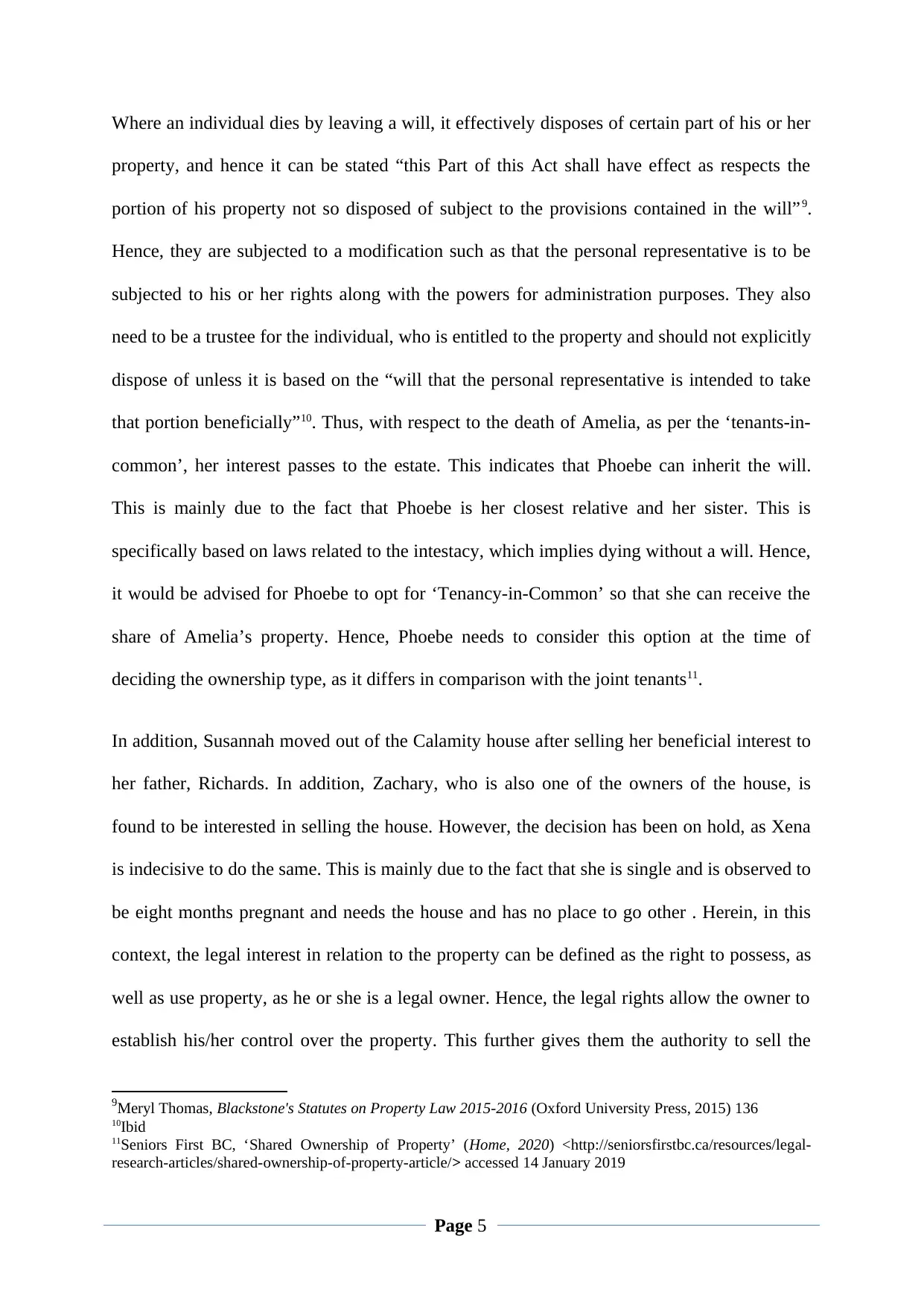
Where an individual dies by leaving a will, it effectively disposes of certain part of his or her
property, and hence it can be stated “this Part of this Act shall have effect as respects the
portion of his property not so disposed of subject to the provisions contained in the will”9.
Hence, they are subjected to a modification such as that the personal representative is to be
subjected to his or her rights along with the powers for administration purposes. They also
need to be a trustee for the individual, who is entitled to the property and should not explicitly
dispose of unless it is based on the “will that the personal representative is intended to take
that portion beneficially”10. Thus, with respect to the death of Amelia, as per the ‘tenants-in-
common’, her interest passes to the estate. This indicates that Phoebe can inherit the will.
This is mainly due to the fact that Phoebe is her closest relative and her sister. This is
specifically based on laws related to the intestacy, which implies dying without a will. Hence,
it would be advised for Phoebe to opt for ‘Tenancy-in-Common’ so that she can receive the
share of Amelia’s property. Hence, Phoebe needs to consider this option at the time of
deciding the ownership type, as it differs in comparison with the joint tenants11.
In addition, Susannah moved out of the Calamity house after selling her beneficial interest to
her father, Richards. In addition, Zachary, who is also one of the owners of the house, is
found to be interested in selling the house. However, the decision has been on hold, as Xena
is indecisive to do the same. This is mainly due to the fact that she is single and is observed to
be eight months pregnant and needs the house and has no place to go other . Herein, in this
context, the legal interest in relation to the property can be defined as the right to possess, as
well as use property, as he or she is a legal owner. Hence, the legal rights allow the owner to
establish his/her control over the property. This further gives them the authority to sell the
9Meryl Thomas, Blackstone's Statutes on Property Law 2015-2016 (Oxford University Press, 2015) 136
10Ibid
11Seniors First BC, ‘Shared Ownership of Property’ (Home, 2020) <http://seniorsfirstbc.ca/resources/legal-
research-articles/shared-ownership-of-property-article/> accessed 14 January 2019
Page 5
property, and hence it can be stated “this Part of this Act shall have effect as respects the
portion of his property not so disposed of subject to the provisions contained in the will”9.
Hence, they are subjected to a modification such as that the personal representative is to be
subjected to his or her rights along with the powers for administration purposes. They also
need to be a trustee for the individual, who is entitled to the property and should not explicitly
dispose of unless it is based on the “will that the personal representative is intended to take
that portion beneficially”10. Thus, with respect to the death of Amelia, as per the ‘tenants-in-
common’, her interest passes to the estate. This indicates that Phoebe can inherit the will.
This is mainly due to the fact that Phoebe is her closest relative and her sister. This is
specifically based on laws related to the intestacy, which implies dying without a will. Hence,
it would be advised for Phoebe to opt for ‘Tenancy-in-Common’ so that she can receive the
share of Amelia’s property. Hence, Phoebe needs to consider this option at the time of
deciding the ownership type, as it differs in comparison with the joint tenants11.
In addition, Susannah moved out of the Calamity house after selling her beneficial interest to
her father, Richards. In addition, Zachary, who is also one of the owners of the house, is
found to be interested in selling the house. However, the decision has been on hold, as Xena
is indecisive to do the same. This is mainly due to the fact that she is single and is observed to
be eight months pregnant and needs the house and has no place to go other . Herein, in this
context, the legal interest in relation to the property can be defined as the right to possess, as
well as use property, as he or she is a legal owner. Hence, the legal rights allow the owner to
establish his/her control over the property. This further gives them the authority to sell the
9Meryl Thomas, Blackstone's Statutes on Property Law 2015-2016 (Oxford University Press, 2015) 136
10Ibid
11Seniors First BC, ‘Shared Ownership of Property’ (Home, 2020) <http://seniorsfirstbc.ca/resources/legal-
research-articles/shared-ownership-of-property-article/> accessed 14 January 2019
Page 5
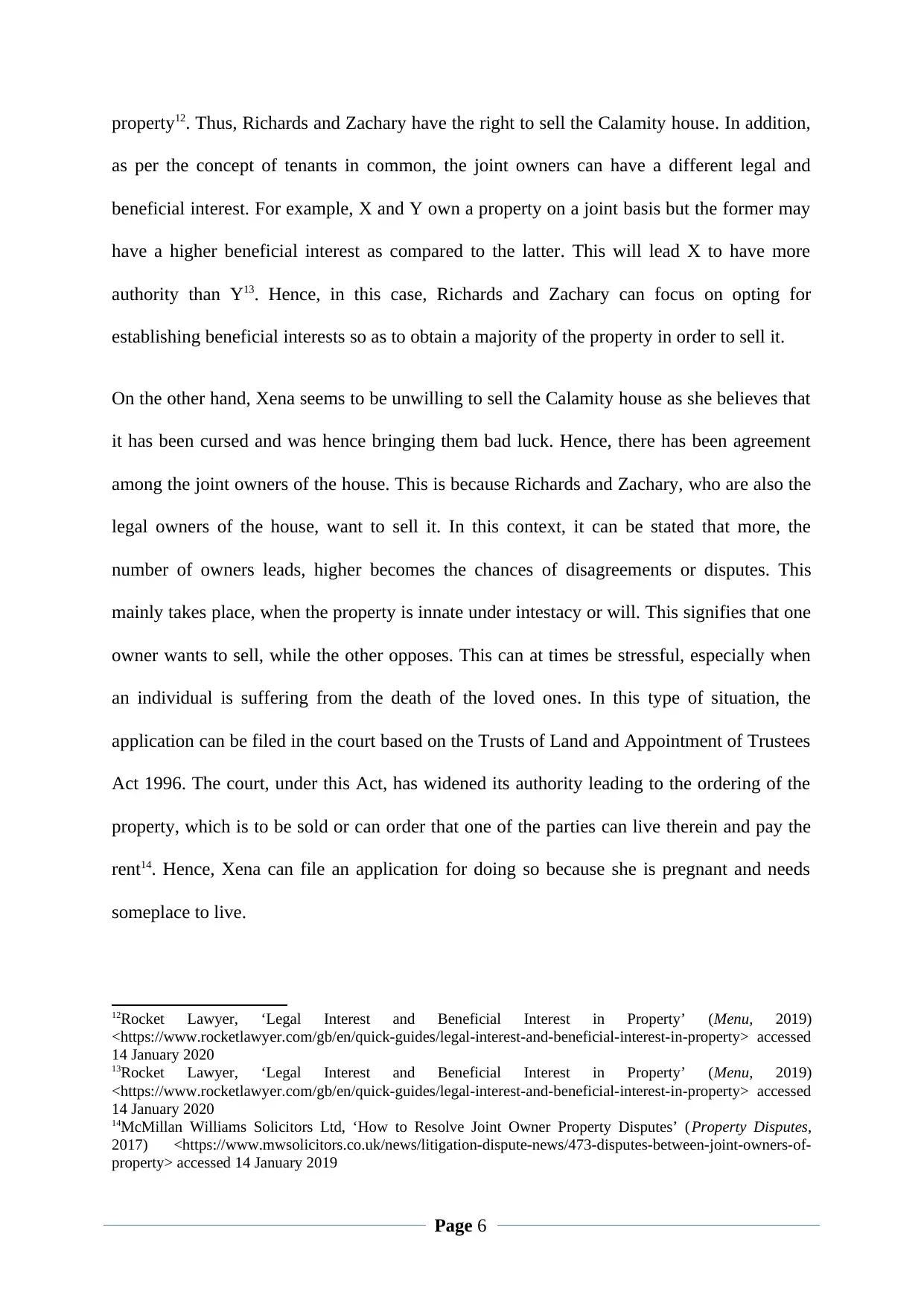
property12. Thus, Richards and Zachary have the right to sell the Calamity house. In addition,
as per the concept of tenants in common, the joint owners can have a different legal and
beneficial interest. For example, X and Y own a property on a joint basis but the former may
have a higher beneficial interest as compared to the latter. This will lead X to have more
authority than Y13. Hence, in this case, Richards and Zachary can focus on opting for
establishing beneficial interests so as to obtain a majority of the property in order to sell it.
On the other hand, Xena seems to be unwilling to sell the Calamity house as she believes that
it has been cursed and was hence bringing them bad luck. Hence, there has been agreement
among the joint owners of the house. This is because Richards and Zachary, who are also the
legal owners of the house, want to sell it. In this context, it can be stated that more, the
number of owners leads, higher becomes the chances of disagreements or disputes. This
mainly takes place, when the property is innate under intestacy or will. This signifies that one
owner wants to sell, while the other opposes. This can at times be stressful, especially when
an individual is suffering from the death of the loved ones. In this type of situation, the
application can be filed in the court based on the Trusts of Land and Appointment of Trustees
Act 1996. The court, under this Act, has widened its authority leading to the ordering of the
property, which is to be sold or can order that one of the parties can live therein and pay the
rent14. Hence, Xena can file an application for doing so because she is pregnant and needs
someplace to live.
12Rocket Lawyer, ‘Legal Interest and Beneficial Interest in Property’ (Menu, 2019)
<https://www.rocketlawyer.com/gb/en/quick-guides/legal-interest-and-beneficial-interest-in-property> accessed
14 January 2020
13Rocket Lawyer, ‘Legal Interest and Beneficial Interest in Property’ (Menu, 2019)
<https://www.rocketlawyer.com/gb/en/quick-guides/legal-interest-and-beneficial-interest-in-property> accessed
14 January 2020
14McMillan Williams Solicitors Ltd, ‘How to Resolve Joint Owner Property Disputes’ (Property Disputes,
2017) <https://www.mwsolicitors.co.uk/news/litigation-dispute-news/473-disputes-between-joint-owners-of-
property> accessed 14 January 2019
Page 6
as per the concept of tenants in common, the joint owners can have a different legal and
beneficial interest. For example, X and Y own a property on a joint basis but the former may
have a higher beneficial interest as compared to the latter. This will lead X to have more
authority than Y13. Hence, in this case, Richards and Zachary can focus on opting for
establishing beneficial interests so as to obtain a majority of the property in order to sell it.
On the other hand, Xena seems to be unwilling to sell the Calamity house as she believes that
it has been cursed and was hence bringing them bad luck. Hence, there has been agreement
among the joint owners of the house. This is because Richards and Zachary, who are also the
legal owners of the house, want to sell it. In this context, it can be stated that more, the
number of owners leads, higher becomes the chances of disagreements or disputes. This
mainly takes place, when the property is innate under intestacy or will. This signifies that one
owner wants to sell, while the other opposes. This can at times be stressful, especially when
an individual is suffering from the death of the loved ones. In this type of situation, the
application can be filed in the court based on the Trusts of Land and Appointment of Trustees
Act 1996. The court, under this Act, has widened its authority leading to the ordering of the
property, which is to be sold or can order that one of the parties can live therein and pay the
rent14. Hence, Xena can file an application for doing so because she is pregnant and needs
someplace to live.
12Rocket Lawyer, ‘Legal Interest and Beneficial Interest in Property’ (Menu, 2019)
<https://www.rocketlawyer.com/gb/en/quick-guides/legal-interest-and-beneficial-interest-in-property> accessed
14 January 2020
13Rocket Lawyer, ‘Legal Interest and Beneficial Interest in Property’ (Menu, 2019)
<https://www.rocketlawyer.com/gb/en/quick-guides/legal-interest-and-beneficial-interest-in-property> accessed
14 January 2020
14McMillan Williams Solicitors Ltd, ‘How to Resolve Joint Owner Property Disputes’ (Property Disputes,
2017) <https://www.mwsolicitors.co.uk/news/litigation-dispute-news/473-disputes-between-joint-owners-of-
property> accessed 14 January 2019
Page 6
⊘ This is a preview!⊘
Do you want full access?
Subscribe today to unlock all pages.

Trusted by 1+ million students worldwide
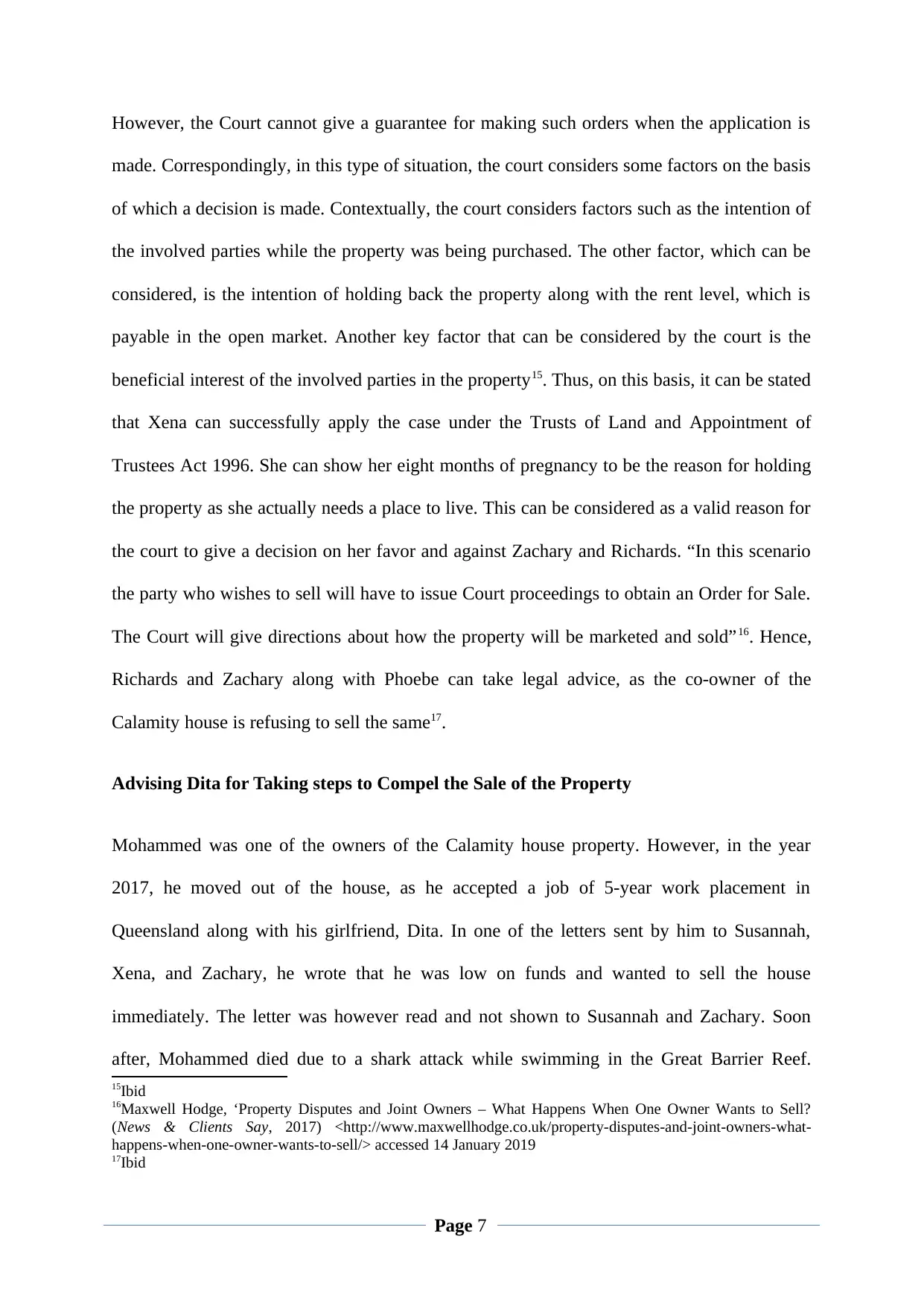
However, the Court cannot give a guarantee for making such orders when the application is
made. Correspondingly, in this type of situation, the court considers some factors on the basis
of which a decision is made. Contextually, the court considers factors such as the intention of
the involved parties while the property was being purchased. The other factor, which can be
considered, is the intention of holding back the property along with the rent level, which is
payable in the open market. Another key factor that can be considered by the court is the
beneficial interest of the involved parties in the property15. Thus, on this basis, it can be stated
that Xena can successfully apply the case under the Trusts of Land and Appointment of
Trustees Act 1996. She can show her eight months of pregnancy to be the reason for holding
the property as she actually needs a place to live. This can be considered as a valid reason for
the court to give a decision on her favor and against Zachary and Richards. “In this scenario
the party who wishes to sell will have to issue Court proceedings to obtain an Order for Sale.
The Court will give directions about how the property will be marketed and sold”16. Hence,
Richards and Zachary along with Phoebe can take legal advice, as the co-owner of the
Calamity house is refusing to sell the same17.
Advising Dita for Taking steps to Compel the Sale of the Property
Mohammed was one of the owners of the Calamity house property. However, in the year
2017, he moved out of the house, as he accepted a job of 5-year work placement in
Queensland along with his girlfriend, Dita. In one of the letters sent by him to Susannah,
Xena, and Zachary, he wrote that he was low on funds and wanted to sell the house
immediately. The letter was however read and not shown to Susannah and Zachary. Soon
after, Mohammed died due to a shark attack while swimming in the Great Barrier Reef.
15Ibid
16Maxwell Hodge, ‘Property Disputes and Joint Owners – What Happens When One Owner Wants to Sell?
(News & Clients Say, 2017) <http://www.maxwellhodge.co.uk/property-disputes-and-joint-owners-what-
happens-when-one-owner-wants-to-sell/> accessed 14 January 2019
17Ibid
Page 7
made. Correspondingly, in this type of situation, the court considers some factors on the basis
of which a decision is made. Contextually, the court considers factors such as the intention of
the involved parties while the property was being purchased. The other factor, which can be
considered, is the intention of holding back the property along with the rent level, which is
payable in the open market. Another key factor that can be considered by the court is the
beneficial interest of the involved parties in the property15. Thus, on this basis, it can be stated
that Xena can successfully apply the case under the Trusts of Land and Appointment of
Trustees Act 1996. She can show her eight months of pregnancy to be the reason for holding
the property as she actually needs a place to live. This can be considered as a valid reason for
the court to give a decision on her favor and against Zachary and Richards. “In this scenario
the party who wishes to sell will have to issue Court proceedings to obtain an Order for Sale.
The Court will give directions about how the property will be marketed and sold”16. Hence,
Richards and Zachary along with Phoebe can take legal advice, as the co-owner of the
Calamity house is refusing to sell the same17.
Advising Dita for Taking steps to Compel the Sale of the Property
Mohammed was one of the owners of the Calamity house property. However, in the year
2017, he moved out of the house, as he accepted a job of 5-year work placement in
Queensland along with his girlfriend, Dita. In one of the letters sent by him to Susannah,
Xena, and Zachary, he wrote that he was low on funds and wanted to sell the house
immediately. The letter was however read and not shown to Susannah and Zachary. Soon
after, Mohammed died due to a shark attack while swimming in the Great Barrier Reef.
15Ibid
16Maxwell Hodge, ‘Property Disputes and Joint Owners – What Happens When One Owner Wants to Sell?
(News & Clients Say, 2017) <http://www.maxwellhodge.co.uk/property-disputes-and-joint-owners-what-
happens-when-one-owner-wants-to-sell/> accessed 14 January 2019
17Ibid
Page 7
Paraphrase This Document
Need a fresh take? Get an instant paraphrase of this document with our AI Paraphraser
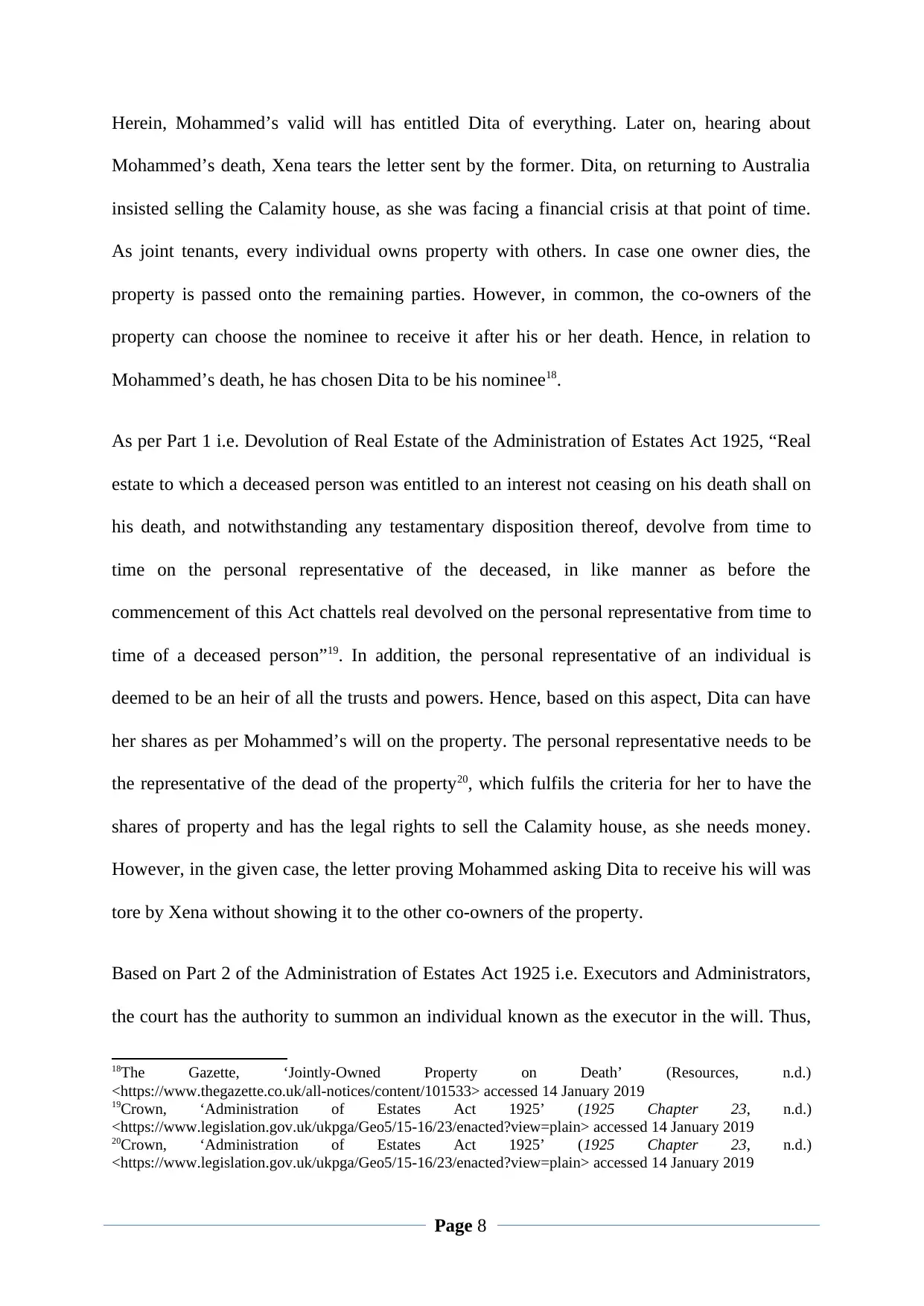
Herein, Mohammed’s valid will has entitled Dita of everything. Later on, hearing about
Mohammed’s death, Xena tears the letter sent by the former. Dita, on returning to Australia
insisted selling the Calamity house, as she was facing a financial crisis at that point of time.
As joint tenants, every individual owns property with others. In case one owner dies, the
property is passed onto the remaining parties. However, in common, the co-owners of the
property can choose the nominee to receive it after his or her death. Hence, in relation to
Mohammed’s death, he has chosen Dita to be his nominee18.
As per Part 1 i.e. Devolution of Real Estate of the Administration of Estates Act 1925, “Real
estate to which a deceased person was entitled to an interest not ceasing on his death shall on
his death, and notwithstanding any testamentary disposition thereof, devolve from time to
time on the personal representative of the deceased, in like manner as before the
commencement of this Act chattels real devolved on the personal representative from time to
time of a deceased person”19. In addition, the personal representative of an individual is
deemed to be an heir of all the trusts and powers. Hence, based on this aspect, Dita can have
her shares as per Mohammed’s will on the property. The personal representative needs to be
the representative of the dead of the property20, which fulfils the criteria for her to have the
shares of property and has the legal rights to sell the Calamity house, as she needs money.
However, in the given case, the letter proving Mohammed asking Dita to receive his will was
tore by Xena without showing it to the other co-owners of the property.
Based on Part 2 of the Administration of Estates Act 1925 i.e. Executors and Administrators,
the court has the authority to summon an individual known as the executor in the will. Thus,
18The Gazette, ‘Jointly-Owned Property on Death’ (Resources, n.d.)
<https://www.thegazette.co.uk/all-notices/content/101533> accessed 14 January 2019
19Crown, ‘Administration of Estates Act 1925’ (1925 Chapter 23, n.d.)
<https://www.legislation.gov.uk/ukpga/Geo5/15-16/23/enacted?view=plain> accessed 14 January 2019
20Crown, ‘Administration of Estates Act 1925’ (1925 Chapter 23, n.d.)
<https://www.legislation.gov.uk/ukpga/Geo5/15-16/23/enacted?view=plain> accessed 14 January 2019
Page 8
Mohammed’s death, Xena tears the letter sent by the former. Dita, on returning to Australia
insisted selling the Calamity house, as she was facing a financial crisis at that point of time.
As joint tenants, every individual owns property with others. In case one owner dies, the
property is passed onto the remaining parties. However, in common, the co-owners of the
property can choose the nominee to receive it after his or her death. Hence, in relation to
Mohammed’s death, he has chosen Dita to be his nominee18.
As per Part 1 i.e. Devolution of Real Estate of the Administration of Estates Act 1925, “Real
estate to which a deceased person was entitled to an interest not ceasing on his death shall on
his death, and notwithstanding any testamentary disposition thereof, devolve from time to
time on the personal representative of the deceased, in like manner as before the
commencement of this Act chattels real devolved on the personal representative from time to
time of a deceased person”19. In addition, the personal representative of an individual is
deemed to be an heir of all the trusts and powers. Hence, based on this aspect, Dita can have
her shares as per Mohammed’s will on the property. The personal representative needs to be
the representative of the dead of the property20, which fulfils the criteria for her to have the
shares of property and has the legal rights to sell the Calamity house, as she needs money.
However, in the given case, the letter proving Mohammed asking Dita to receive his will was
tore by Xena without showing it to the other co-owners of the property.
Based on Part 2 of the Administration of Estates Act 1925 i.e. Executors and Administrators,
the court has the authority to summon an individual known as the executor in the will. Thus,
18The Gazette, ‘Jointly-Owned Property on Death’ (Resources, n.d.)
<https://www.thegazette.co.uk/all-notices/content/101533> accessed 14 January 2019
19Crown, ‘Administration of Estates Act 1925’ (1925 Chapter 23, n.d.)
<https://www.legislation.gov.uk/ukpga/Geo5/15-16/23/enacted?view=plain> accessed 14 January 2019
20Crown, ‘Administration of Estates Act 1925’ (1925 Chapter 23, n.d.)
<https://www.legislation.gov.uk/ukpga/Geo5/15-16/23/enacted?view=plain> accessed 14 January 2019
Page 8
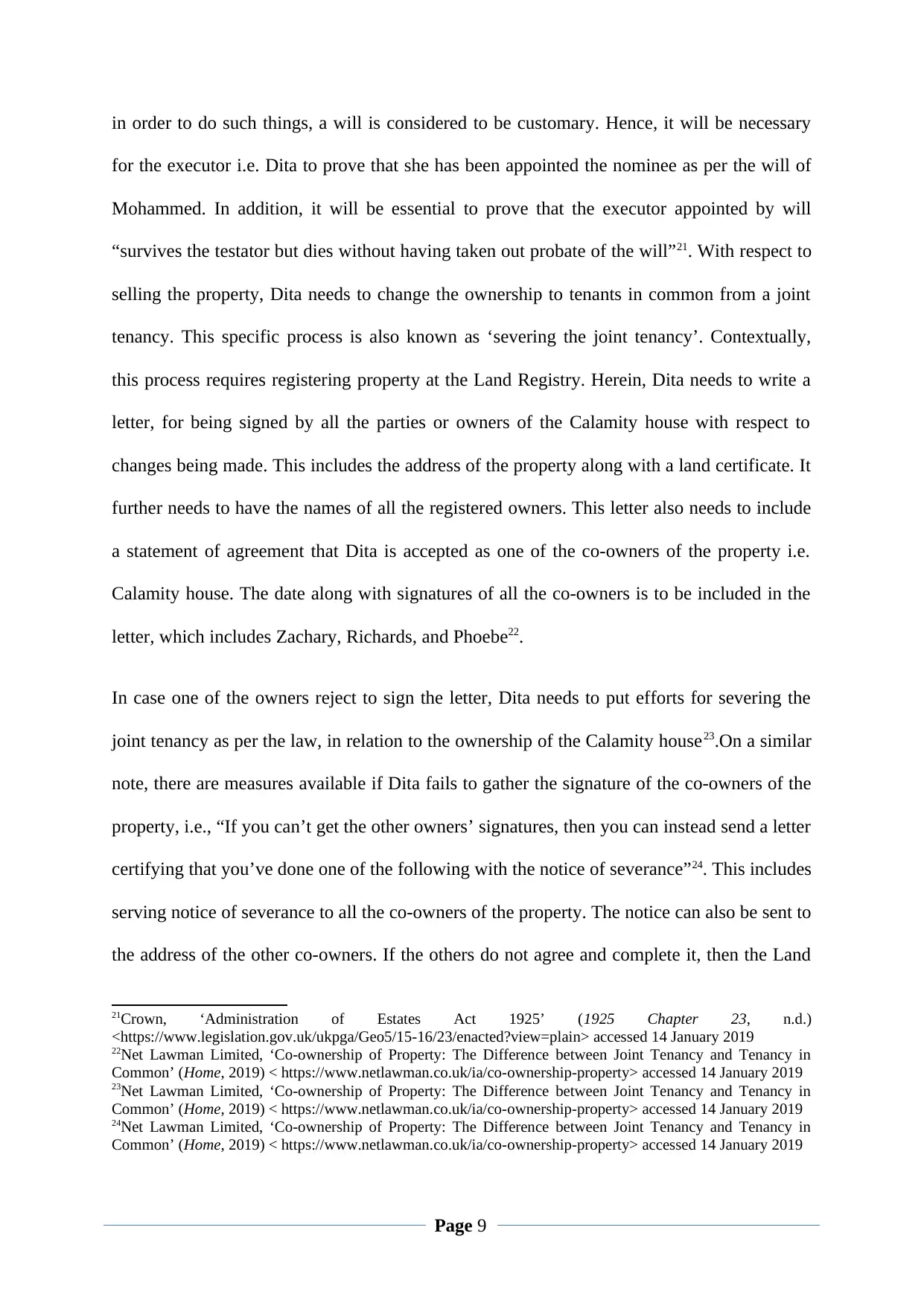
in order to do such things, a will is considered to be customary. Hence, it will be necessary
for the executor i.e. Dita to prove that she has been appointed the nominee as per the will of
Mohammed. In addition, it will be essential to prove that the executor appointed by will
“survives the testator but dies without having taken out probate of the will”21. With respect to
selling the property, Dita needs to change the ownership to tenants in common from a joint
tenancy. This specific process is also known as ‘severing the joint tenancy’. Contextually,
this process requires registering property at the Land Registry. Herein, Dita needs to write a
letter, for being signed by all the parties or owners of the Calamity house with respect to
changes being made. This includes the address of the property along with a land certificate. It
further needs to have the names of all the registered owners. This letter also needs to include
a statement of agreement that Dita is accepted as one of the co-owners of the property i.e.
Calamity house. The date along with signatures of all the co-owners is to be included in the
letter, which includes Zachary, Richards, and Phoebe22.
In case one of the owners reject to sign the letter, Dita needs to put efforts for severing the
joint tenancy as per the law, in relation to the ownership of the Calamity house23.On a similar
note, there are measures available if Dita fails to gather the signature of the co-owners of the
property, i.e., “If you can’t get the other owners’ signatures, then you can instead send a letter
certifying that you’ve done one of the following with the notice of severance”24. This includes
serving notice of severance to all the co-owners of the property. The notice can also be sent to
the address of the other co-owners. If the others do not agree and complete it, then the Land
21Crown, ‘Administration of Estates Act 1925’ (1925 Chapter 23, n.d.)
<https://www.legislation.gov.uk/ukpga/Geo5/15-16/23/enacted?view=plain> accessed 14 January 2019
22Net Lawman Limited, ‘Co-ownership of Property: The Difference between Joint Tenancy and Tenancy in
Common’ (Home, 2019) < https://www.netlawman.co.uk/ia/co-ownership-property> accessed 14 January 2019
23Net Lawman Limited, ‘Co-ownership of Property: The Difference between Joint Tenancy and Tenancy in
Common’ (Home, 2019) < https://www.netlawman.co.uk/ia/co-ownership-property> accessed 14 January 2019
24Net Lawman Limited, ‘Co-ownership of Property: The Difference between Joint Tenancy and Tenancy in
Common’ (Home, 2019) < https://www.netlawman.co.uk/ia/co-ownership-property> accessed 14 January 2019
Page 9
for the executor i.e. Dita to prove that she has been appointed the nominee as per the will of
Mohammed. In addition, it will be essential to prove that the executor appointed by will
“survives the testator but dies without having taken out probate of the will”21. With respect to
selling the property, Dita needs to change the ownership to tenants in common from a joint
tenancy. This specific process is also known as ‘severing the joint tenancy’. Contextually,
this process requires registering property at the Land Registry. Herein, Dita needs to write a
letter, for being signed by all the parties or owners of the Calamity house with respect to
changes being made. This includes the address of the property along with a land certificate. It
further needs to have the names of all the registered owners. This letter also needs to include
a statement of agreement that Dita is accepted as one of the co-owners of the property i.e.
Calamity house. The date along with signatures of all the co-owners is to be included in the
letter, which includes Zachary, Richards, and Phoebe22.
In case one of the owners reject to sign the letter, Dita needs to put efforts for severing the
joint tenancy as per the law, in relation to the ownership of the Calamity house23.On a similar
note, there are measures available if Dita fails to gather the signature of the co-owners of the
property, i.e., “If you can’t get the other owners’ signatures, then you can instead send a letter
certifying that you’ve done one of the following with the notice of severance”24. This includes
serving notice of severance to all the co-owners of the property. The notice can also be sent to
the address of the other co-owners. If the others do not agree and complete it, then the Land
21Crown, ‘Administration of Estates Act 1925’ (1925 Chapter 23, n.d.)
<https://www.legislation.gov.uk/ukpga/Geo5/15-16/23/enacted?view=plain> accessed 14 January 2019
22Net Lawman Limited, ‘Co-ownership of Property: The Difference between Joint Tenancy and Tenancy in
Common’ (Home, 2019) < https://www.netlawman.co.uk/ia/co-ownership-property> accessed 14 January 2019
23Net Lawman Limited, ‘Co-ownership of Property: The Difference between Joint Tenancy and Tenancy in
Common’ (Home, 2019) < https://www.netlawman.co.uk/ia/co-ownership-property> accessed 14 January 2019
24Net Lawman Limited, ‘Co-ownership of Property: The Difference between Joint Tenancy and Tenancy in
Common’ (Home, 2019) < https://www.netlawman.co.uk/ia/co-ownership-property> accessed 14 January 2019
Page 9
⊘ This is a preview!⊘
Do you want full access?
Subscribe today to unlock all pages.

Trusted by 1+ million students worldwide
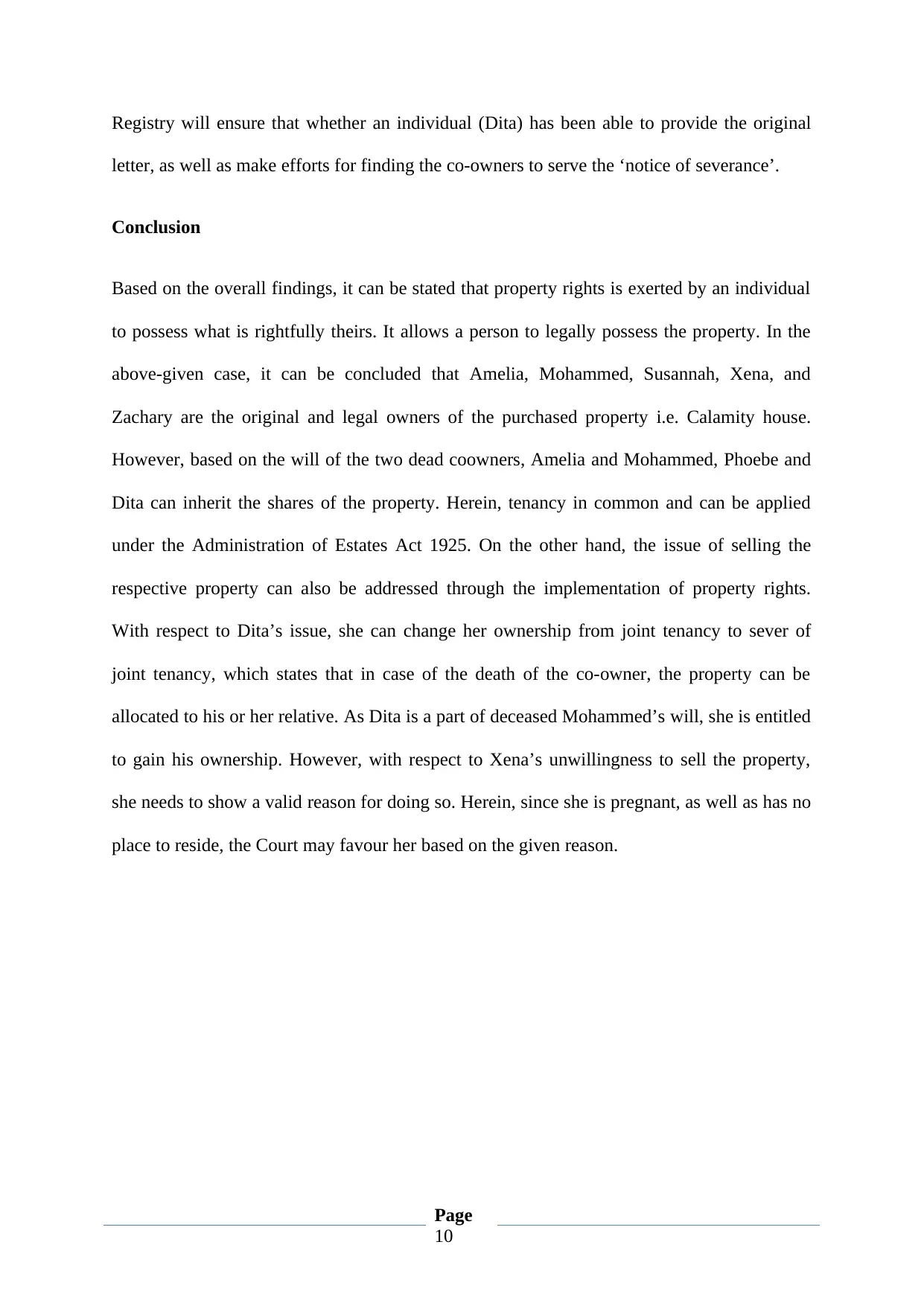
Registry will ensure that whether an individual (Dita) has been able to provide the original
letter, as well as make efforts for finding the co-owners to serve the ‘notice of severance’.
Conclusion
Based on the overall findings, it can be stated that property rights is exerted by an individual
to possess what is rightfully theirs. It allows a person to legally possess the property. In the
above-given case, it can be concluded that Amelia, Mohammed, Susannah, Xena, and
Zachary are the original and legal owners of the purchased property i.e. Calamity house.
However, based on the will of the two dead coowners, Amelia and Mohammed, Phoebe and
Dita can inherit the shares of the property. Herein, tenancy in common and can be applied
under the Administration of Estates Act 1925. On the other hand, the issue of selling the
respective property can also be addressed through the implementation of property rights.
With respect to Dita’s issue, she can change her ownership from joint tenancy to sever of
joint tenancy, which states that in case of the death of the co-owner, the property can be
allocated to his or her relative. As Dita is a part of deceased Mohammed’s will, she is entitled
to gain his ownership. However, with respect to Xena’s unwillingness to sell the property,
she needs to show a valid reason for doing so. Herein, since she is pregnant, as well as has no
place to reside, the Court may favour her based on the given reason.
Page
10
letter, as well as make efforts for finding the co-owners to serve the ‘notice of severance’.
Conclusion
Based on the overall findings, it can be stated that property rights is exerted by an individual
to possess what is rightfully theirs. It allows a person to legally possess the property. In the
above-given case, it can be concluded that Amelia, Mohammed, Susannah, Xena, and
Zachary are the original and legal owners of the purchased property i.e. Calamity house.
However, based on the will of the two dead coowners, Amelia and Mohammed, Phoebe and
Dita can inherit the shares of the property. Herein, tenancy in common and can be applied
under the Administration of Estates Act 1925. On the other hand, the issue of selling the
respective property can also be addressed through the implementation of property rights.
With respect to Dita’s issue, she can change her ownership from joint tenancy to sever of
joint tenancy, which states that in case of the death of the co-owner, the property can be
allocated to his or her relative. As Dita is a part of deceased Mohammed’s will, she is entitled
to gain his ownership. However, with respect to Xena’s unwillingness to sell the property,
she needs to show a valid reason for doing so. Herein, since she is pregnant, as well as has no
place to reside, the Court may favour her based on the given reason.
Page
10
Paraphrase This Document
Need a fresh take? Get an instant paraphrase of this document with our AI Paraphraser
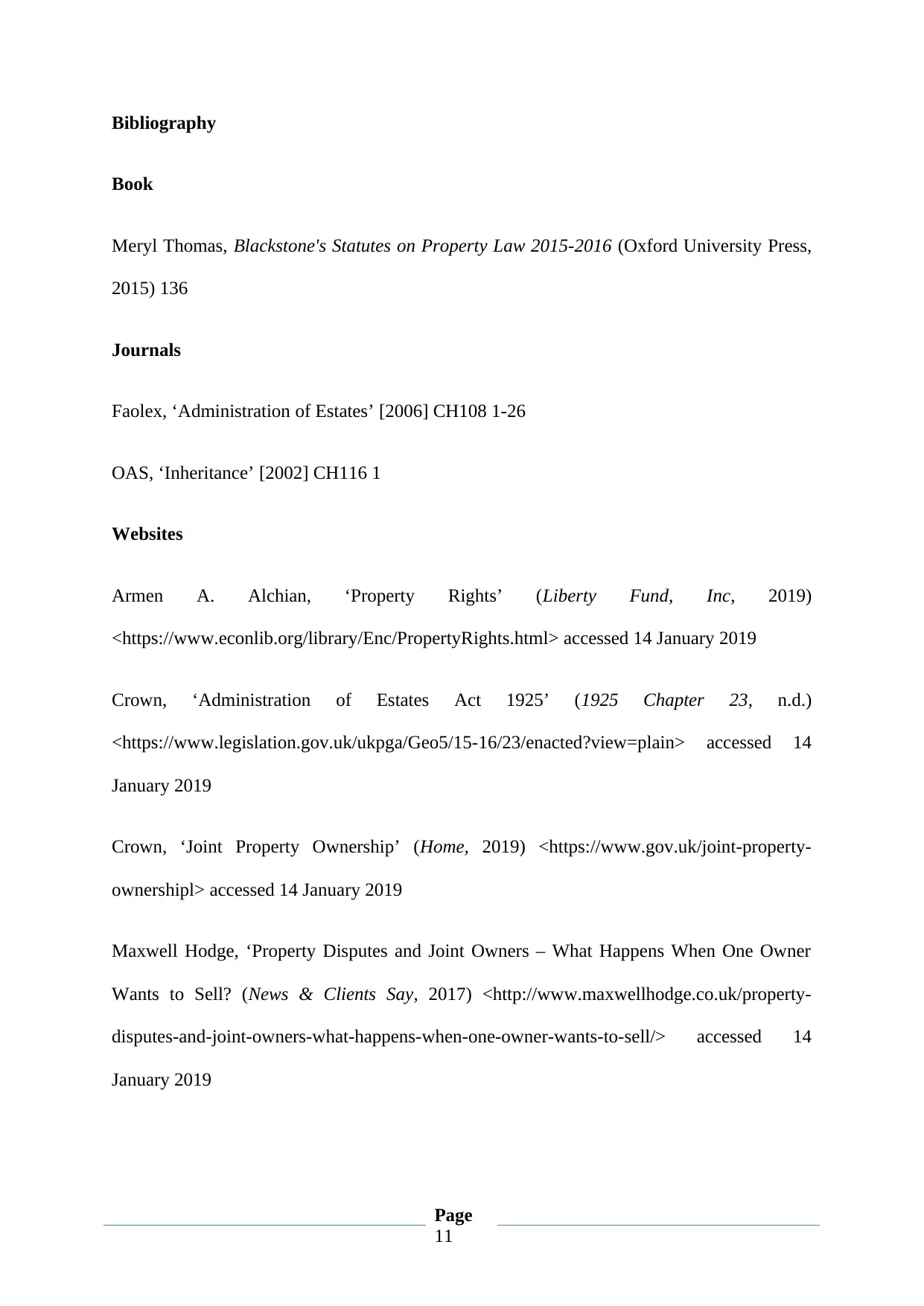
Bibliography
Book
Meryl Thomas, Blackstone's Statutes on Property Law 2015-2016 (Oxford University Press,
2015) 136
Journals
Faolex, ‘Administration of Estates’ [2006] CH108 1-26
OAS, ‘Inheritance’ [2002] CH116 1
Websites
Armen A. Alchian, ‘Property Rights’ (Liberty Fund, Inc, 2019)
<https://www.econlib.org/library/Enc/PropertyRights.html> accessed 14 January 2019
Crown, ‘Administration of Estates Act 1925’ (1925 Chapter 23, n.d.)
<https://www.legislation.gov.uk/ukpga/Geo5/15-16/23/enacted?view=plain> accessed 14
January 2019
Crown, ‘Joint Property Ownership’ (Home, 2019) <https://www.gov.uk/joint-property-
ownershipl> accessed 14 January 2019
Maxwell Hodge, ‘Property Disputes and Joint Owners – What Happens When One Owner
Wants to Sell? (News & Clients Say, 2017) <http://www.maxwellhodge.co.uk/property-
disputes-and-joint-owners-what-happens-when-one-owner-wants-to-sell/> accessed 14
January 2019
Page
11
Book
Meryl Thomas, Blackstone's Statutes on Property Law 2015-2016 (Oxford University Press,
2015) 136
Journals
Faolex, ‘Administration of Estates’ [2006] CH108 1-26
OAS, ‘Inheritance’ [2002] CH116 1
Websites
Armen A. Alchian, ‘Property Rights’ (Liberty Fund, Inc, 2019)
<https://www.econlib.org/library/Enc/PropertyRights.html> accessed 14 January 2019
Crown, ‘Administration of Estates Act 1925’ (1925 Chapter 23, n.d.)
<https://www.legislation.gov.uk/ukpga/Geo5/15-16/23/enacted?view=plain> accessed 14
January 2019
Crown, ‘Joint Property Ownership’ (Home, 2019) <https://www.gov.uk/joint-property-
ownershipl> accessed 14 January 2019
Maxwell Hodge, ‘Property Disputes and Joint Owners – What Happens When One Owner
Wants to Sell? (News & Clients Say, 2017) <http://www.maxwellhodge.co.uk/property-
disputes-and-joint-owners-what-happens-when-one-owner-wants-to-sell/> accessed 14
January 2019
Page
11
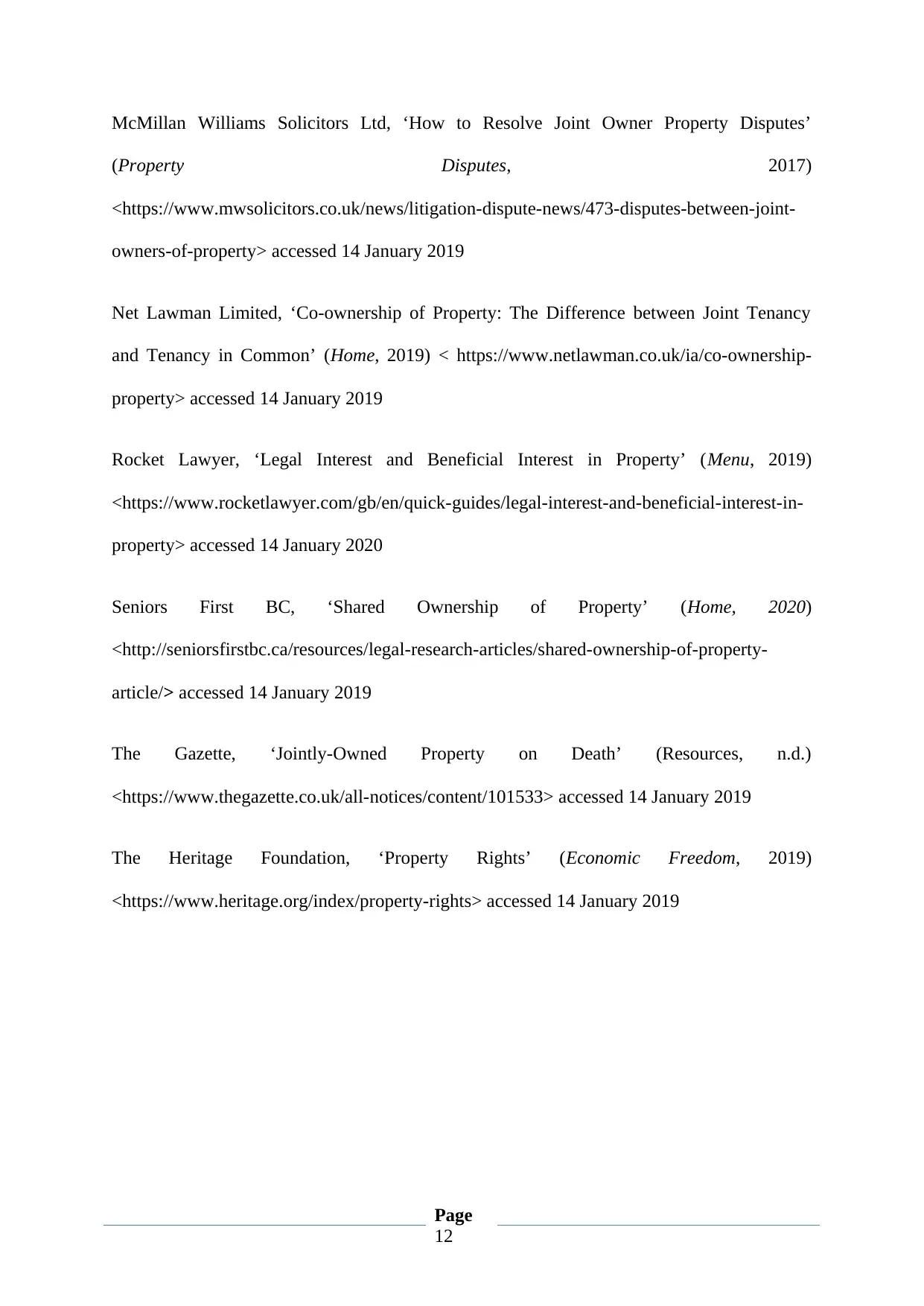
McMillan Williams Solicitors Ltd, ‘How to Resolve Joint Owner Property Disputes’
(Property Disputes, 2017)
<https://www.mwsolicitors.co.uk/news/litigation-dispute-news/473-disputes-between-joint-
owners-of-property> accessed 14 January 2019
Net Lawman Limited, ‘Co-ownership of Property: The Difference between Joint Tenancy
and Tenancy in Common’ (Home, 2019) < https://www.netlawman.co.uk/ia/co-ownership-
property> accessed 14 January 2019
Rocket Lawyer, ‘Legal Interest and Beneficial Interest in Property’ (Menu, 2019)
<https://www.rocketlawyer.com/gb/en/quick-guides/legal-interest-and-beneficial-interest-in-
property> accessed 14 January 2020
Seniors First BC, ‘Shared Ownership of Property’ (Home, 2020)
<http://seniorsfirstbc.ca/resources/legal-research-articles/shared-ownership-of-property-
article/> accessed 14 January 2019
The Gazette, ‘Jointly-Owned Property on Death’ (Resources, n.d.)
<https://www.thegazette.co.uk/all-notices/content/101533> accessed 14 January 2019
The Heritage Foundation, ‘Property Rights’ (Economic Freedom, 2019)
<https://www.heritage.org/index/property-rights> accessed 14 January 2019
Page
12
(Property Disputes, 2017)
<https://www.mwsolicitors.co.uk/news/litigation-dispute-news/473-disputes-between-joint-
owners-of-property> accessed 14 January 2019
Net Lawman Limited, ‘Co-ownership of Property: The Difference between Joint Tenancy
and Tenancy in Common’ (Home, 2019) < https://www.netlawman.co.uk/ia/co-ownership-
property> accessed 14 January 2019
Rocket Lawyer, ‘Legal Interest and Beneficial Interest in Property’ (Menu, 2019)
<https://www.rocketlawyer.com/gb/en/quick-guides/legal-interest-and-beneficial-interest-in-
property> accessed 14 January 2020
Seniors First BC, ‘Shared Ownership of Property’ (Home, 2020)
<http://seniorsfirstbc.ca/resources/legal-research-articles/shared-ownership-of-property-
article/> accessed 14 January 2019
The Gazette, ‘Jointly-Owned Property on Death’ (Resources, n.d.)
<https://www.thegazette.co.uk/all-notices/content/101533> accessed 14 January 2019
The Heritage Foundation, ‘Property Rights’ (Economic Freedom, 2019)
<https://www.heritage.org/index/property-rights> accessed 14 January 2019
Page
12
⊘ This is a preview!⊘
Do you want full access?
Subscribe today to unlock all pages.

Trusted by 1+ million students worldwide
1 out of 12
Related Documents
Your All-in-One AI-Powered Toolkit for Academic Success.
+13062052269
info@desklib.com
Available 24*7 on WhatsApp / Email
![[object Object]](/_next/static/media/star-bottom.7253800d.svg)
Unlock your academic potential
Copyright © 2020–2026 A2Z Services. All Rights Reserved. Developed and managed by ZUCOL.





